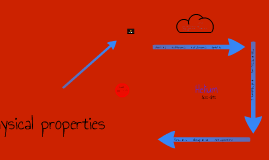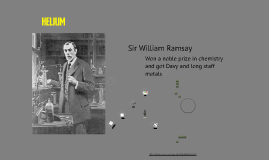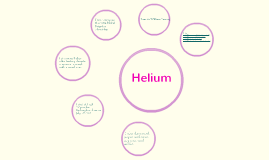Helium
Transcript: History Helium is a noble gas; it has an atomic mass of 4.0026 It consists of 2 protons and 2 neutrons. Unlike any other element, helium will remain liquid down to absolute zero at normal pressures. This is a direct effect of quantum mechanics: specifically, the zero point energy of the system is too high to allow freezing. Its boiling point is 4.2K Its critical temperature is 5.2K Helium is tasteless, odorless, colorless, normally nontoxic, and the second most abundant element in existence. Normally found in the sun. It launches rockets, cools nuclear reactors, lifts weather balloons, and treats asthmatics. Helium is the first of the Noble Gases. It is very non-reactive. So much so, that it doesn't form compounds with anything. Just like neon and argon, helium just floats around all by itself. It is non-reactive because it's shell is full. Helium only has one atomic shell, which fills up when it has two electrons. Appearance and common uses for Helium Helium in its pure form Bibliography As with any gas with differing density from air, inhaling a small volume of helium temporarily changes the timbre and quality of the human voice. Helium does not provide any nourishment to the organs or the brain, and the brain can only manage five or six seconds deprivation from vital oxygen before unconsciousness occurs. If you inhale to much it will fill your lungs and deprive you brain of oxygen causing unconsciousness. Compounds Jordan Griffin The lighter of the noble gases, was the first to be discovered. In fact, this element was first identified in the Sun rather than in the Earth. In 1868, during a solar eclipse in India. http://nautilus.fis.uc.pt/st2.5/scenes-e/elem/e00210.html http://www.ptable.com/ http://0.tqn.com/d/chemistry/1/7/w/2/1/helium-atom.jpg http://www.chemmybear.com/helium.html http://www.chem4kids.com/files/elements/002_comps.html] http://en.wikipedia.org/wiki/Helium www.dictionary.com To get Helium in its pure form you have to chill it to -265 C. Everything will liquefy or freeze, except the helium which will remain gaseous. Helium Critical Temperature- The temperature above which a gas cannot be liquefied; the temperature above which a substance cannot exhibit distinct gas and liquid phases. Proton- Positive charge in the nucleus Neutron- Does not have a charge but is slightly larger than a proton Electron- Has virtually no mass and a negative charge in the electron cloud Asthmatics- A person suffering from asthma Absolute zero- 0K where no atoms move Minimum melting pressure- The minimum pressure at which an element melts Deprivation- The damaging lack of material benefits considered to be basic necessities in a society Gaseous- Of, relating to, or having the characteristics of a gas Noble gas- A group of chemical elements with very similar properties: under standard conditions, they are all odorless, colorless, monatomic gases, with very low chemical reactivity Block two Dangers Glossary Green- Neutron Yellow- Electron Red- Proton Period 1 Class 18 Properties of Liquid Helium Helium-4 Helium-3 Critical temperature: 5.2K Boiling point: 4.2K Melting Point: .095K Minimum melting pressure: 25 atm 29 atm at 0.3K Superfluid transition temperature at saturated vapor pressure: 2.17 K 1 mK in zero magnetic field

















